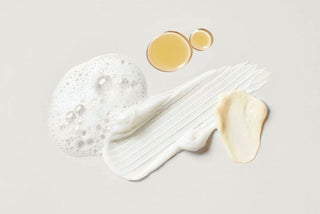What is sensitive skin?
Sensitive skin is characterized by being more fragile, vulnerable, and susceptible to constant reactions, allergies, irritations, inflammation, or other skin disorders such as eczema, rosacea, dermatitis, or generalized redness.
This is because sensitive skin reacts more easily to internal imbalances and/or external stressors such as certain cosmetic ingredients, exposure to cold, heat, sun, pollution, stress, poor diet, hormones, tobacco, or alcohol, among others.
Sensitive skin suffers from an alteration in the function of the skin's protective barrier, which promotes greater water loss, making the skin more easily dehydrated, leaving it unprotected and allowing the penetration of potentially irritating external agents.
Likewise, a weakened skin barrier intensifies the harmful effects of sun exposure on this type of skin, so permanent and intense protection from UVA and UVB rays is essential.
It's important to differentiate between sensitive skin and reactive or sensitized skin. Reactive or sensitized skin doesn't present any underlying pathology or dermatological predisposition and isn't constantly irritated, inflamed, or allergic. It's a temporary skin condition caused by a one-time reaction to certain products, active ingredients, or external exposures that cause mild, controlled redness, inflammation, hives, or eczema.
In any case, the care for permanently sensitive skin or temporarily reactive skin can be the same and the same formulas can be used.
Characteristics of sensitive skin
- Thin, fragile and weakened skin texture.
- Dull, lackluster skin tone.
- Redness appears very easily in general or specific areas.
- Recurring sensation of itching, tightness and heat (especially when using cosmetic products).
- Tendency to dryness and flaking.
- You easily experience allergic reactions, irritations, inflammations or other types of disorders.
Routine for caring for sensitive or sensitized skin
The 6 steps to follow to get the most out of a skincare routine for sensitive or sensitized skin—both day and night—are as follows:

If you have questions about the correct order of application, consult our guide.
Recommended products
Discover all the formulas suitable for sensitive or sensitized skin types here.








Dos and Don'ts
✔ If you have sensitive or reactive skin, it is always recommended to consult a specialist who can assess your skin condition and diagnose or rule out any allergies, conditions, or medical predispositions that may be worth considering (such as eczema, rosacea, dermatitis, cyperaceae, psoriasis, couperose, etc.).
✔ For sensitive skin or those with a specific reaction, the most important thing is to soothe, balance, protect, and strengthen the skin barrier as much as possible.
✔ Use a sunscreen with a very high SPF (SPF 50 or more) daily, as the reaction to UVA and UVB rays is greater and more damaging.
✔ Use formulas that do not contain parabens, as they are highly irritating.
✔ Promote the use of soothing and repairing active ingredients such as niacinamide, centella asiatica, probiotics, or panthenol, among others.
✔ Take special care with the eye contour area as it is one of the most sensitive areas and susceptible to allergies.
✗ Avoid products that contain strong exfoliating active ingredients. Instead, use enzymatic peels, which exfoliate the skin but also soften it. BHA acids are also a good option as they exfoliate the skin while having an anti-inflammatory effect.
✗ Aggressive double cleansing is not recommended daily to avoid overly weakening the skin's protective barrier. Gentle cleansing oils or milks specifically designed for sensitive skin can be used if you need to remove a large amount of makeup or other clogs before cleansing.
✗ Avoid products with high levels of perfume, alcohol, soap, or low-quality essential oils as much as possible, as these are irritating substances and promote fragility.



 BUY
BUY BUY
BUY


